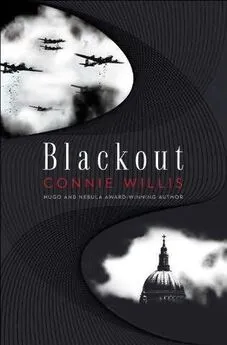Connie Willis - Blackout
- Название:Blackout
- Автор:
- Жанр:
- Издательство:неизвестно
- Год:неизвестен
- ISBN:нет данных
- Рейтинг:
- Избранное:Добавить в избранное
-
Отзывы:
-
Ваша оценка:
Connie Willis - Blackout краткое содержание
In her first novel since 2002, Nebula and Hugo award-winning author Connie Willis returns with a stunning, enormously entertaining novel of time travel, war, and the deeds—great and small—of ordinary people who shape history. In the hands of this acclaimed storyteller, the past and future collide—and the result is at once intriguing, elusive, and frightening.
Oxford in 2060 is a chaotic place. Scores of time-traveling historians are being sent into the past, to destinations including the American Civil War and the attack on the World Trade Center. Michael Davies is prepping to go to Pearl Harbor. Merope Ward is coping with a bunch of bratty 1940 evacuees and trying to talk her thesis adviser, Mr. Dunworthy, into letting her go to VE Day. Polly Churchill’s next assignment will be as a shopgirl in the middle of London’s Blitz. And seventeen-year-old Colin Templer, who has a major crush on Polly, is determined to go to the Crusades so that he can “catch up” to her in age.
But now the time-travel lab is suddenly canceling assignments for no apparent reason and switching around everyone’s schedules. And when Michael, Merope, and Polly finally get to World War II, things just get worse. For there they face air raids, blackouts, unexploded bombs, dive-bombing Stukas, rationing, shrapnel, V-1s, and two of the most incorrigible children in all of history—to say nothing of a growing feeling that not only their assignments but the war and history itself are spiraling out of control.
Blackout - читать онлайн бесплатно полную версию (весь текст целиком)
Интервал:
Закладка:
“Till May second, which is why I didn’t know about Dunkirk.”
“If the evacuation lasted till the end of the war,” he said, “maybe you can talk Dunworthy into letting you stay on to do VE-Day. Or you could just not come back.”
She shook her head. “The retrieval team would come after me. And even if I could elude them, staying would mean I’d have to put up with Alf and Binnie for another five-”
“Merope!” someone called.
Michael turned and looked across the quad. “Someone’s looking for you.”
It was Colin Templer. He loped up to them. “Do you know where Polly is?”
“At Wardrobe,” Eileen said.
“I thought she said she was coming here.”
“She was. She did. She came to see Mr. Dunworthy, but he’s in with someone, and she couldn’t wait.”
“What do you mean, he’s in with someone? Mr. Dunworthy’s not here. He’s in London. He won’t be back till tonight.”
Eileen turned to Michael. “But you said-”
“That damned secretary of his!” Michael exploded. “He didn’t say a word about Dunworthy’s being gone. He just asked if I’d care to wait, and I assumed-”
“This is dreadful!” Eileen said. “Now what am I going to do about my driving lessons?”
“How late tonight?” Michael asked Colin.
“I don’t know,” Colin began, but Michael was already striding up the stairs and into Mr. Dunworthy’s office. “You said Polly’s over at Wardrobe?” Colin asked Eileen.
She nodded, and Colin took off at a run. Michael came back, shaking his head. “He won’t be back before midnight at the earliest. He went to see some temporal theorist named Ishiwaka. And here I wasted an entire afternoon-no offense,” he said. “It’s just that I didn’t have enough time to get ready for this drop as it is, and now-”
“I know. I only have two days, and now I’ll have to wait till tomorrow to get my driving lessons approved.”
“No, you won’t,” he said, digging in his pockets. “I got permission from him for lessons in piloting small craft when I thought I was going to Pearl Harbor. If he didn’t fill it out…” He pulled out a slip of paper and unfolded it. “Good, he didn’t. He just signed it. Here.”
“But won’t you need it?”
“Not till I get back from Dover,” he said. “I’ll tell him I lost it and need another form.” He handed it to her.
“Thank you,” she said fervently. “You’ve saved my life.” She looked at her watch. If she hurried, she could make it to Props and get the driving authorization before they closed. “I need to go.”
“So do I,” he said, walking her back to the gate. “I need to go memorize the map of Dover and the names of the boats that participated in the evacuation, all seven hundred of them.”
They started out through the gate and nearly collided with Colin. “I thought you were going to find Polly,” Eileen said.
“I was,” Colin said breathlessly. “But when I got to Wardrobe, they asked me if I knew where you were, Mr. Davies, and I said yes, and they said to come tell you they need you to come talk to them straightaway. They said they’d had to give your costume to Gerald Phipps and they need you to come in to try on a new one.”
Look Out in the Blackout!
-BRITISH GOVERNMENT POSTER, 1939Oxford-April 2060
BADRI ADJUSTED THE FOLDS OF THE NET AROUND MIKE. “I’m sending you through to 5 A.M. on May twenty-fourth,” he said.
Good, Mike thought. The evacuation wouldn’t start till Sunday the twenty-sixth, and the civilian boats wouldn’t start bringing soldiers back till the next day, so he’d have plenty of time to get to Dover and figure out how to get out to the docks.
“There may be slippage of an hour or two,” Badri said, “depending on who’s in the area and might see the shimmer.” But when they sent him through a few minutes later, it was much darker than an hour or two before dawn should be-a total, blanketing darkness. He waited for his eyes to adjust, but there was no light to adjust to.
He couldn’t see any stars or lights, though that could be due to the blackout. In May of 1940, no outdoor lights had been allowed, cars’ lights had had to be masked, and windows had had to be covered with blackout curtains. The contemps had complained about how dangerous it had been to get around in the blackout, and now he could see-or, rather, not see-why. His first instinct was to put his hands out in front of him and feel his way forward, but this was the southeastern coast of England. He could be on the edge of a chalk cliff, and one step could send him plummeting to his death.
He stood still, listening. He could hear the faint sound of waves lapping the shore off to his right. From the twenty-third on, the fires of the burning town of Dunkirk had been visible from parts of the coast, but he couldn’t see any red on the horizon. Or any horizon, for that matter. Which meant either this wasn’t one of those parts or he’d come through earlier than the twenty-third, even though the whole point of picking this site was that it didn’t have temporal slippage.
You can figure out the time later, he thought. Right now you need to find out where you are. The waves sounded level with him, not somewhere below. Good. He slid one foot slightly forward. Gravel. The shingle of a beach. Or a road down which someone would presently come driving with the shuttered headlights that only let the driver see a few feet ahead, in which case he needed to get off said road right away. But he couldn’t hear any sound of an engine, and the road north of Dover wound along the tops of the cliffs, not down along the beaches.
He stooped and patted the gravel. It was damp. He swept his hand in a semicircle and could feel a patch of wet sand and what felt like a shell. Definitely a beach-though in 1940, an English beach was probably more dangerous than a road. It was likely to be mined or covered with barbed wire-or both-and in the dark he could easily trip and impale himself on a tank trap.
Props had sent a book of safety matches through with him. He debated lighting one to give him an idea of where he was. It should be all right. The beach had to be deserted. The drop wouldn’t have opened if there’d been anyone to see its shimmer. But that had been several minutes ago. A soldier might be patrolling or there might be a ship out there in the Channel. He couldn’t see anything, but some vessels had run without lights to keep from being spotted by the Germans. And the shimmer would be visible for a long way over water. Even a match’s tiny flame could be seen for miles. More than one World War II convoy had been sunk by submarines because a careless sailor had lit a cigarette.
So, no light. And unless he wanted to be blown up by a land mine, no wandering around in the dark. Which meant his only option was to stay put and hope dawn wasn’t too far off. He lowered himself carefully down onto the sand and settled in to wait for dawn.
I could have been spending this time prepping in Oxford instead of sitting here in the dark, he thought. He could be memorizing that list of naval ships that had participated in the evacuation he hadn’t had time to, or finding out exactly where the returning troops had docked and how he was going to get access to the dock when the press wasn’t allowed.
Damn Dunworthy and his schedule changes, he thought. The damp sand was soaking through his pants. He stood up, took his jacket off, folded it, sat down again, and resumed staring into the darkness. And shivering.
It was growing steadily chillier. It’s much too cold for May twenty-fourth, he thought, and suddenly remembered every horror story he’d ever heard-the medieval historian they’d sent through to the wrong year who’d ended up smack in the middle of the Black Death; the one back in the early days of the net, when they’d still thought historians could affect events, who’d gone through to 1935 to shoot Hitler and found himself in East Berlin in 1970. And the historian who’d tried to go through to Waterloo-which was a divergence point just like Dunkirk-and ended up in America in the wilds of Sioux territory.
What if he wasn’t in 1940 at all? Or what if, rather than being on an English beach, he was on one in the South Pacific, and the Japanese were about to invade? That would explain why he’d come through in the middle of the night-didn’t the Japanese always sneak ashore before dawn?
Don’t be ridiculous, he thought. It’s too cold to be the South Pacific. So cold his legs were beginning to cramp. He rubbed them and then stretched them out. And jammed his foot against something hard. He jerked it back instantly. Had that been one of the metal struts of a tank trap? They sometimes had mines balanced on top, set to topple and explode at the slightest motion.
He scrambled to his knees and leaned forward, feeling cautiously along the sand to the base of whatever it was. Rock, he thought, relieved. Rock rising straight up out of the sand. The cliff? No, when he patted up its side, it was only slightly higher than his head and no more than four feet wide. It must be one of those freestanding rocks that occurred on beaches, the kind tourists climbed on. He maneuvered around to sit with his back against it and straightened his legs again, cautiously this time.
It was a good thing, since he hit another rock. This one stood at an angle to the first one and was much wider and thicker. When he climbed up to feel how tall it was, the sound of the waves became suddenly louder, which explained why the drop site was here. The rocks could hide him-and the shimmer as the drop opened-from the beach.
But if they had, there wouldn’t have been any slippage. The drop must be at least partly visible, either from the water or from the beach. Or somewhere above it. Civilian coastwatchers had been posted all along the eastern coast, and one of them might have their binoculars trained on the beach right now. Or would at 5 A.M., which was why he’d been sent through earlier.
Which means I’d better be careful when it begins to get light. If he didn’t die of hypothermia first. Jesus, it was cold. He was going to have to put his jacket back on. He wished he had the one Wardrobe had given to Phipps. It was a lot warmer than this one. He stood up, legs protesting, put it on, and sat down again. Come on, he thought. Let’s get this show on the road.
Centuries crawled by. Mike took his jacket off and draped it over him blanket-style. He burrowed into the rock, trying to get warm, trying to stay awake. In spite of the cold, he could hardly keep his eyes open. Isn’t sleepiness the first sign of hypothermia? he thought drowsily.
It’s not hypothermia, it’s time-lag. And the fact that you’ve been up all night and the night before that trying to get ready for this damned assignment. All so he could sit here in the dark and freeze to death. I not only could have memorized the ships, I could have memorized the names of all the small craft, too, all seven hundred of them. And the names of all three hundred thousand soldiers they rescued.
When the sky finally began to lighten several geologic ages later, he thought at first it was an illusion brought on by staring into the darkness too long. But that really was the outline of the rock opposite him he was seeing, tar black against the velvet black of the sky, and when he stood up and peeked cautiously over the other rock toward the sound of the waves, the darkness was a shade grayer. Within minutes he could make out the line of white surf and behind him a looming cliff, ghostly pale in the darkness. A chalk cliff, which meant he was in the right place.
Читать дальшеИнтервал:
Закладка:

![Jane_BlackCat - Понять не поздно... [СИ]](/books/1148838/jane-blackcat-ponyat-ne-pozdno-si.webp)
![Jane_BlackCat - За краем Вечности [СИ]](/books/1148839/jane-blackcat-za-kraem-vechnosti-si.webp)

